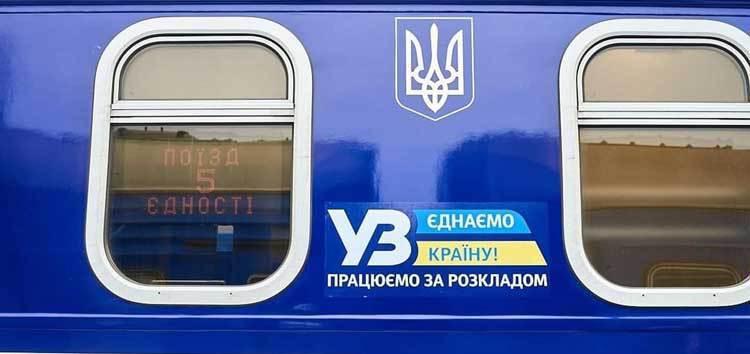- EBRD repurposes €50 million of existing loan to Ukraine rail company to provide liquidity
- Support is part of €1 billion EBRD activity in Ukraine this year, with donors and partners
- Signed by EBRD President, Minister of Finance and CEO of UkrZaliznytsya
The EBRD has repurposed part of an existing loan to provide €50 million of liquidity to UkrZaliznytsya (UZ), Ukraine’s railway company known in English as Ukrainian Railways. The aim is to keep trains running as the country grapples with invasion by Russia.
The loan was signed in a virtual ceremony by the EBRD President, Ukraine’s Minister of Finance and the CEO of UkrZaliznytsya.
EBRD President Odile Renaud-Basso said: “In partnership with the European Union, we are proud to make a contribution to Ukrainian Railways for the continued running of this critical service. The financing will support the movement of goods and people, including displaced persons, and help maintain Ukraine’s trade links with the outside world.”
Ukraine’s Minister of Finance, Sergii Marchenko, added: “Since the first days of the war, the personnel of UkrZaliznytysa has demonstrated heroism, transferring our citizens to more safe regions of Ukraine and ensuring the humanitarian security of Ukraine, and we are enormously grateful to them. Today’s agreement will help ensure adequate financing of UkrZaliznytsya’s needs.”
CEO of Ukrzaliznytsya, Olexander Kamyshin, said: “This decision shows that first steps are already being taken under a new “Marshall Plan of rebuilding Ukraine”. The first €50 million will help Ukrainian Railways to cope with the significant damage that Russia inflicts every day. We must focus not only on the resilience of our work but also on the recovery of the country’s economy. We continue to provide solutions to increase freight traffic and we have to provide opportunities for Ukrainians to return home. This loan is critical for the maintenance of our stable liquidity. I am grateful to international institutions for continuous support and hope that we will soon be able to demonstrate real and effective results of our partnership.”
The EBRD originally agreed to lend €150 million to UZ, the monopoly provider of rail transportation in Ukraine, to upgrade and electrify one section of the country’s nearly 20,000 km of railway and related infrastructure. That loan has yet to be disbursed.
The war that has followed Russia’s invasion on 24 February has triggered urgent liquidity needs that prompted the repurposing of the funds. UZ needs to ensure continued and uninterrupted provision of essential cargo and passenger transportation and evacuation services critical for the affected population, as well as for the broader economy and functioning of the private sector.
With donors and partners, the EBRD has pledged to invest €1 billion this year in supporting the Ukrainian economy.
To address the economy’s current needs, the EBRD is prioritising five areas: trade finance, energy security, vital infrastructure, food security (covering the provision of liquidity to farmers via banks for the spring sowing campaign as well as to agribusiness companies and food retailers) and the provision of liquidity to pharmaceutical companies. Investments in all areas will involve risk-sharing with partners.
The EBRD was swift to condemn the Russian invasion of Ukraine on 24 February and pledged to stand by Ukraine. In early April, the EBRD’s Board of Governors voted to suspend open-endedly the access of Russia and Belarus to EBRD finance and expertise, and the Bank has closed its offices in the two countries.
As well as providing a €2 billion resilience package for Ukraine and neighbouring countries affected by the war, the EBRD has pledged to help finance Ukraine’s reconstruction once conditions permit.
The European Union’s European Fund for Sustainable Development (EFSD) is expected to support the project as part of a common programme with the EBRD that focuses on municipal, infrastructure and industrial resilience in the European Neighbourhood East and European Neighbourhood South. The programme supports economies affected by the Covid-19 pandemic and now by the war on Ukraine.




